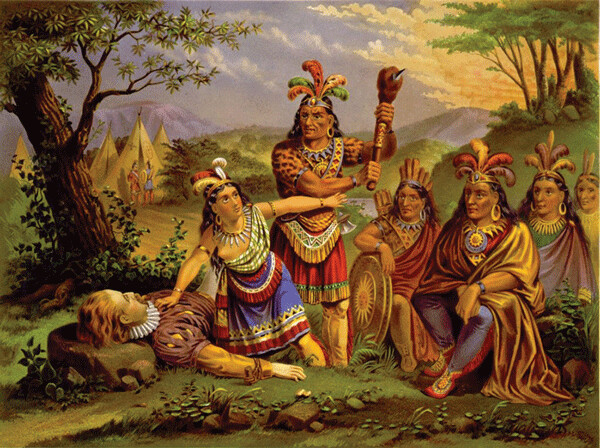Pocahontas is an inspiration, not a racial slur

President Donald Trump has the most powerful bully pulpit in the world. Sadly, he uses it to do just that: to bully, to demean, to wreak havoc. On Monday, he met in the Oval Office with three of the surviving 13 Navajo Code Talkers, ostensibly to honor them for their courageous service in World War II. As young men, they were recruited into the U.S. Marines to use their native Navajo language in the war against Japan. They used 600 Navajo words, each of which had a code meaning useful in combat communications. They are credited with helping the U.S. win key battles like Guadalcanal and Iwo Jima. In the space of a few minutes, though, Trump veered off message: ”You were here long before any of us were here,” Trump said, addressing the Navajo men, all in their 90s. “Although we have a representative in Congress who, they say, was here a long time ago. They call her ‘Pocahontas.’ But you know what, I like you because you are special. You are special people.” Trump’s dig was directed at Democratic Massachusetts Sen. Elizabeth Warren, and her belief based on family lore that she has some Cherokee ancestry. There is no evidence that she ever used the claim to advance her career. Her unverified lineage became an issue in her 2012 senatorial campaign, and Trump, perceiving her as a potential challenger in 2020, has repeatedly called her “Pocahontas.”
To add insult to injury, the backdrop of the Oval Office ceremony with the Navajo veterans was a portrait of President Andrew Jackson that Trump had installed upon assuming the presidency. During his two terms, from 1829-1837, President Jackson, known as “Indian Killer” and “Sharp Knife,” accelerated the removal of native tribes from the southeastern U.S., with forced marches to reservations west of the Mississippi River. Thousands of Native Americans died. These death marches would become known as the “Trail of Tears.”
If Trump were a reader of history, he might know that calling someone “Pocahontas” is actually a compliment, not an insult. Pocahontas was a real person who displayed courage and conviction in her very short life. She was born around 1595 in the Tidewater region of what is now called Virginia, and was named Matoaka, then nicknamed Pocahontas. Her father was named Powhatan, which also was the name of the affiliation of 30 or so Algonquin tribes in the region. According to one account, she saved English colonist John Smith from execution in 1607. In 1995, Disney released a blockbuster animated film based on that story.
“Most Americans at this point understand her as a Disney character,” Mary Kathryn Nagle told us on the “Democracy Now!” news hour. Nagle is a citizen of Cherokee Nation and an attorney who works to restore tribal sovereignty and jurisdiction. “Her real true story has been commodified and retold in a false narrative that celebrates her union with her abuser. She was a survivor of a form of violence, of colonial violence, at a time when native women were primary targets, because the colonial powers who came over here from 1492 and even past 1776 knew that a primary way of destroying a tribal nation, an indigenous nation, is to attack the women.”
Matoaka, or Pocahontas, actively sought peace between her indigenous people and the white, European colonists. In 1613, she was kidnapped and held prisoner at Jamestown. During captivity, she converted to Christianity and later married John Rolfe, a prominent tobacco grower. Rolfe took her to England, where she died at the age of 20 or 21. She was buried in Gravesend, England, and her remains have never been located.
The abduction of Matoaka/Pocahontas has current parallels. The disappearance of native women from the oil boom fields of North Dakota and the Canadian tar sands region is an ongoing and underreported epidemic. Olivia Lone Bear, a 32-year-old mother of five from the Mandan, Hidatsa and Arikara Nation in North Dakota, has been missing since Oct. 24. She is just one of hundreds who have gone missing.
Imagine if Trump used his vast Twitter following to assist in the search for Olivia. Instead, Trump retweets anti-Muslim videos put out by an extreme right-wing racist group from the U.K., attacks African-American athletes for their civil-rights protests, and supports Alabama Senate candidate Roy Moore, accused of child molestation and serial sexual harassment of teenage girls. Meanwhile, Trump himself stands accused of sexual harassment and assault by no less than 16 women.
Pocahontas died 400 years ago this year. Let’s remember her name, not because it is invoked by a powerful man who preys on the vulnerable, but to inspire action, advancing indigenous rights and women’s rights.
